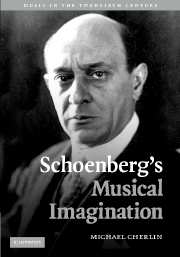Book contents
- Frontmatter
- Contents
- List of music examples and figures
- Acknowledgements
- Introduction
- 1 A passing of worlds: Gurrelieder as Schoenberg's reluctant farewell to the nineteenth century
- 2 Dialectical opposition in Schoenberg's music and thought
- 3 Dramatic conflict in Pelleas und Melisande
- 4 Motive and memory in Schoenberg's First String Quartet
- 5 Uncanny expressions of time in the music of Arnold Schoenberg
- 6 The tone row as the source of dramatic conflict in Moses und Aron
- 7 The String Trio: metaleptic Schoenberg
- Notes
- Bibliography
- General index – names and topics
- Index of Schoenberg's works and writings
2 - Dialectical opposition in Schoenberg's music and thought
Published online by Cambridge University Press: 22 September 2009
- Frontmatter
- Contents
- List of music examples and figures
- Acknowledgements
- Introduction
- 1 A passing of worlds: Gurrelieder as Schoenberg's reluctant farewell to the nineteenth century
- 2 Dialectical opposition in Schoenberg's music and thought
- 3 Dramatic conflict in Pelleas und Melisande
- 4 Motive and memory in Schoenberg's First String Quartet
- 5 Uncanny expressions of time in the music of Arnold Schoenberg
- 6 The tone row as the source of dramatic conflict in Moses und Aron
- 7 The String Trio: metaleptic Schoenberg
- Notes
- Bibliography
- General index – names and topics
- Index of Schoenberg's works and writings
Summary
Opposition is true Friendship The Marriage of Heaven and Hell
William BlakeEs ist langweilig, wenn die Polizisten interessanter sind als die Räuber. [It is boring if the police are more interesting than the robbers.]
Harmonielehre Arnold SchoenbergIn the Introduction, we began to explore the significance of conflict in Schoenberg's thought and that of his contemporaries, noting there its centrality to Freud's model of the psyche and to the mysterious worlds of Kafka's beleaguered personae. In this chapter we explore the role of conflict within Schoenberg's critical and pedagogical writings, characterizing it as dialectical opposition. After an introduction that provides a general context for our inquiry, an historical sketch traces significant precursors to Schoenbergian dialectics by outlining key developments in the history of dialectical thought and adaptations of that thought within musical discourse. The chapter continues by formulating and discussing various categories of opposition as they are used in music theory in general and in Schoenberg studies in particular. The next three sections of the chapter separate Schoenbergian dialectics into three principal areas: dialectics of history, dialectical aspects of musical technique, and “systems” as failed dialectics. Each of these sections centers on close readings of passages from Schoenberg's critical and pedagogical writings. The chapter concludes with a brief discussion of the implications of dialectical thought for future analysis.
- Type
- Chapter
- Information
- Schoenberg's Musical Imagination , pp. 44 - 67Publisher: Cambridge University PressPrint publication year: 2007

